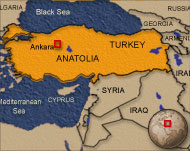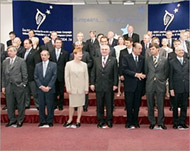A tale of two continents
The atlas says 97% of it lies in Asia. The European Union says Turkey is a European nation. Which is it?

Under EU rules, any European democracy with a market economy that can take on the euro as its currency is eligible to join. Since its founding by six nations in 1957, another 19 indisputably European countries have done so.
Now comes Turkey, of which just a sliver – eastern Thrace – lies in Europe. The rest, Anatolia, lies in Asia, with Istanbul straddling the Bosporus, the natural divide between the two.
Bordered by the Caucasus republics, Iraq, Syria and Iran, Turkey used to be called “Asia Minor.”
But maps can be unhelpful.
Fuzzy
While Europe’s western, northern and most of its southern borders are large seas, its eastern boundaries are fuzzy, especially Europe’s southeastern doorstep to Asia.
 |
|
Geographically, almost all of |
At the EU head office, Europe is often seen as a concept of democracy rather than geography neatly contained by lines on a map.
This is the mantra on the Brussels cocktail circuit where pundits hold forth daily about the EU’s future, at times including Israel, but not its neighbours.
Opponents of Turkey‘s membership say the European Union has been too timid.
“No government, no national parliament and none of the EU institutions has had the courage to publicly question Europe‘s political borders,” says Alain Lamassoure, a French member of the European Parliament.
“None has the courage to say ‘no’ to whatever candidate, and (they) hope someone else will do that.”
Idea
 |
|
EU members too timid, say |
The idea to begin entry talks with Turkey has broad support from EU think tanks and insiders, but many Europeans oppose Turkish membership, and question how European it and its overwhelmingly Muslim population of 71 million people truly are.
In response, a panel of former EU leaders and executives, led by former Finnish President Martti Ahtisaari, issued a 52-page report explaining exactly why Turkey should be in Europe, and stressed that the continent’s southeastern borders “remain … open to interpretation.”
Although only 3% of the country lies geographically in Europe, 11% of the country’s population lives there, and the area also holds much of Istanbul, the country’s economic and cultural capital, the report said.
Besides, the report argued, the Ottoman Empire from which Turkey was born inherited the Byzantine and Eastern Roman realms and much “Greco-Latin and Judeo-Christian culture.”
Noah’s Ark
 |
|
Turkey is a member of Nato |
Noah’s Ark is supposed to have landed in Turkey; St. Peter preached in Antioch; Tarsus was the birthplace of St. Paul, who proselytised in Anatolia.
The empire, home to different religious communities with rights and privileges, went “beyond the Quranic requirement to treat other ‘Peoples of the Book’ – Christians, Jews and Zoroastrians – with special tolerance,” the report said, adding that in 1492, Jews persecuted in Spain settled there.
In the 17th century, the Ottoman Empire extended to Vienna, “often acting as conqueror, like most European powers, and sometimes in close alliance with major European countries.”
European destiny
|
“None has the courage to say ‘no’ to whatever candidate, and (they) hope someone else will do that” Alain Lamassoure. |
The Ottomans were so much part of European history after the 1854-1856 Crimean war that they were “invited to join other European powers in deciding Europe‘s destiny,” the report said.
The document also stressed that despite its population being overwhelmingly Muslim, in 1923, Mustafa Kemal Ataturk ended “the political functions of Islam,” turning Turkey into a modern secular state.
The country is now a member of the Council of Europe, Nato, the Organisation for Economic Cooperation and Development, the Organisation for Security and Cooperation in Europe and the European Bank for Reconstruction and Development.
“Turkey is a full member of all major Europe-wide institutions,” the report said – all, except the EU.
Ankara first applied for membership in 1987, the same year in which the EU rejected Morocco‘s application as “coming from a non-European country.”